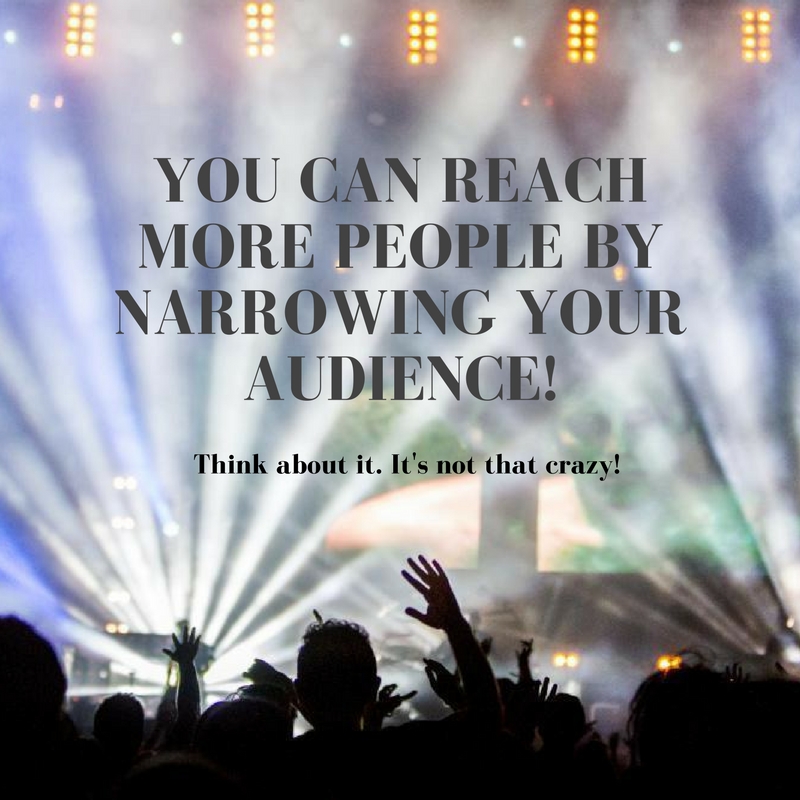I’m deviating a bit again from my website strategy series to bring you an expanded version of the post I wrote to the amazing people subscribed to my newsletter.
I’m about to share with you the best idea I have right now about being super connected with your audience.
I’ve been thinking about it for a long time, and I can’t believe I haven’t shared it explicitly here. I’ve only mentioned it casually because I assumed everyone already knew. But lately, I’ve realized how important it is, and how some people don’t totally understand it. Why would they? Not everyone thinks about communication and audience all day, right?
(But for those of you who have thought about what I’m going to say, think deeper. Think, well yes, but am I really doing this?)
Anyway, this best idea revolves around narrowing your audience. Yep, that might sound a bit crazy.
But here’s what I mean.
Who are you as a business or nonprofit? What is your personality?
How do you stand out from your competition? Once you’ve figured that out, you can find where your audience lives (see my post on Where is Your Audience Hanging Out? for tips on that), and you can reach them, or speak directly to them. It doesn’t matter so much what everyone else — who is not part of your audience — thinks.
That’s what I mean by narrowing your audience because not everyone is ever going to relate to you or your organization’s personality. So, some people are going to close the door on you. And that’s perfectly ok.
Not everyone has to like you. But the people that do, will really like you as in super, super like. These are the people that will become your super fans. And these people matter like crazy because they “get” your organization and they support you.
But if you want to find these super fans, you have to develop your persona, beliefs, etc. and figure out who you want to talk to and how to talk to them.
It helps to think of some concrete examples.
- There’s Apple, known for its easy-to-use, and excellently designed products. There are a lot of hard-core Apple fans. I’m sure you know some.
- World Domination Summit is known as “the event” to go to if you’re an online entrepreneur. It has created a tribe for people building a meaningful business.
- Then, on a smaller but still great scale, there is this awesome business in Northern Virginia called PowerFull Fitness, where the owner Laura Waller has created a community around making fitness fun and also a little bit crazy.
As for nonprofits, there is charity: water, Human Rights Watch, Amnesty, and countless others. They are all focused on advocating for different causes, or similar causes in different ways.
- charity: water is known for water and wells, transparency, accountability, and maybe, to a smaller extent, birthday donations. Its staff shows you its work via authentic, real stories. I donated not only my birthday, but my husband and daughter’s birthday, last year, so I might know a bit more about the organization than the average person.
- 100% of the money it raises goes to the field — to help people get access to clean water. Its mission has a very broad appeal; who doesn’t want to help people get access to clean water? (charity: water has a private donor, who funds its operating costs. Most nonprofits are not able to do this).
- Its going to reach out to people who highly value its own values of transparency and accountability. If you want to read more about charity: water from my perspective, read this post on Nonprofits Telling Awesome Stories: charity: water (Part 1) and this post on Tyler Riewer’s Adventures With charity: water.
- Human Rights Watch is known for its excellent non-biased reporting and investigating. It publishes reports and briefings on human rights conditions in about 90 countries, which generate a ton of news coverage.
- Its going to reach out to people who are passionate about human rights coverage being reported.
- Amnesty International is known for grassroots organizing, letter-writing campaigns, and exposing human rights abuses. It collects member dues, and therefore its members play a huge role in what happens within the organization. Not only do they have local chapters and themed groups, but they hold general assemblies, and regional conferences throughout the year.
- Its going to reach out to people who are passionate about grassroots advocacy, human rights, and those who want their voice heard.
Think about what organization you really love. What values and personality drive it? It could be anything from a sports team to a music band to a nutrition product to a children’s toy. What about it speaks strongly to you? Now, think about the personality you want your organization to have, and get busy finding the people that were meant to be your super fans.
